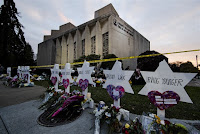Many years ago a
woman gave me a lovely, matted framed poster that reads Words are so powerful
they should only be used to heal, to bless, to prosper. As a child this woman
experienced demeaning verbal violence destroying her opportunity to grow in
self-confidence and self-worth.
 Most of us have been injured by words
recklessly spoken; most of us have spoken words knowingly or unknowingly that
have hurt another. Today we live in a climate that is replete with spoken meanness.
These days I find myself frequently glancing up at the wall hanging, reminding
myself of the import of my spoken words.
Most of us have been injured by words
recklessly spoken; most of us have spoken words knowingly or unknowingly that
have hurt another. Today we live in a climate that is replete with spoken meanness.
These days I find myself frequently glancing up at the wall hanging, reminding
myself of the import of my spoken words.
And the Word was made flesh and dwelt among us. God’s
expression of love, his compassion for humanity became enfleshed in Jesus the
Word. Jesus revealed in the Gospel, the word of God and “the way” of being for
each of us in the world.
In
a message by Pope John Paul II in preparation for a world youth day that could aptly be
used in a Christmas homily he stated: To receive Jesus
Christ means to accept from the Father the command to live, loving Him and our
brothers and sisters, showing solidarity to everyone, without distinction. It
means believing that in the history of humanity even though it is marked by
evil and suffering, the final word belongs to life and to love, because
God came to dwell among us, so we may dwell in Him. Vatican,
July 7, 1999
 Our
calling is to presence Christ in wherever and whatever circumstances we are
involved showing solidarity to everyone without distinction. Yes, there are
situations that present tough challenges for choosing words, especially when “I
feel hurt” or “I know I am right” or when “I feel misunderstood, judged, or
wronged.” To go the extra mile or turn the other cheek I might never want to
choose for an option. But then looking at the person of Jesus, the Word made
flesh who came to heal, to bless and invited us to prosper in God’s saving
grace, and we remember And the Word was made flesh and dwelt among us. and God came to dwell among us, so we may dwell in Him.
Our
calling is to presence Christ in wherever and whatever circumstances we are
involved showing solidarity to everyone without distinction. Yes, there are
situations that present tough challenges for choosing words, especially when “I
feel hurt” or “I know I am right” or when “I feel misunderstood, judged, or
wronged.” To go the extra mile or turn the other cheek I might never want to
choose for an option. But then looking at the person of Jesus, the Word made
flesh who came to heal, to bless and invited us to prosper in God’s saving
grace, and we remember And the Word was made flesh and dwelt among us. and God came to dwell among us, so we may dwell in Him.Sr. Aileen Bankemper, OSB


























